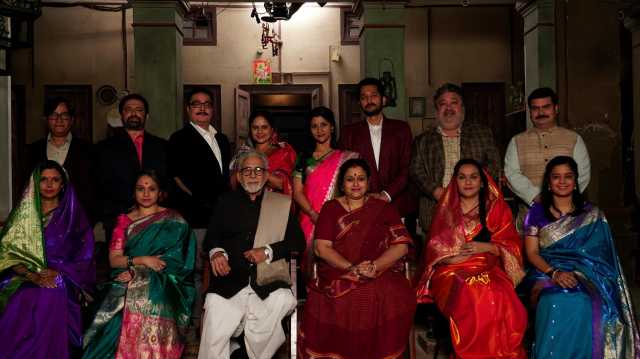
Sonal Pandya
Mumbai, 31 Dec 2020 21:30 IST
Popular actress Pahwa’s directorial debut tackles the intricacies of relationships by blood and by marriage, often with hilarious results.

Stories set around funerals can mine a lot of material, both dramatic and comedic. There is a lot of intentional and unintentional humour to be drawn. Actress Seema Pahwa, for her directorial debut, takes us into the lives of the Bhargava family, whose patriarch, Ram Prasad (Naseeruddin Shah), dies suddenly in the opening minutes of the film.
As his widow Savitri (Supriya Pathak) scrambles to understand the direction her life will now take, the arrival of their six children and various family members adds to the confusion. The family and mourners mingle over 13 days of religious rituals, revealing bygone and new conflicts as they all reside under one roof as the year comes to a close.
With a large ensemble cast featuring Konkona Sensharma, Vinay Pathak, Manoj Pahwa, Parambrata Chatterjee, Ninad Kamat and Vikrant Massey, Seema Pahwa juggles the stories of the various family members as they weave in and out of their ancestral home, as one does in a play. No one is neglected, and the first-time filmmaker ensures that each member of the cast gets his or her moment.
The key conflicts, of course, lie with Ram Prasad’s children, especially the brothers played by Manoj, Kamat, Vinay and Chatterjee. They struggle with managing their filial obligations, now that they are married and have children of their own. And conversations turn to how to take care of their mother, now that their father has passed away, and the discovery of a debt to be paid weighs heavily on them all.
Sudip Sengupta’s camera moves in and out of the large household, eavesdropping on these conversations, like an extra relative and, later, as the lingering ghost of Ram Prasad himself. Seema Pahwa, a veteran theatre artiste, tackles the difficult hierarchies and intricacies of the Bhargavas (incidentally, the director’s maiden family name) with a lot of humour. Even as they are bickering among themselves, each one reveals a certain aspect that comes out only in family settings.
While one uncle insists on the sanctity of certain rituals and traditions, another asks them to do what they think best. There is apt comedy as Vinay’s character takes a selfie at the tehrvi puja and Ram Prasad’s older siblings, sister (Pushpa Joshi) and brother (Rajendra Gupta), quarrel with each other.
Living once again in close quarters, the affection and love is evident, but a glaring disconnect has grown between parent and children, as Savitri feels lost among her own offspring. Seema creates wonderful, mostly silent realizations for Supriya’s character as she looks towards her own future as a widow.
It would have been great to see how she coped afterwards, but like the title, the film sticks to the literal aftermath of 13 days following the patriarch’s death. While a lot of the funeral scenes are tinged with humour, Seema handles the emotional moments nicely with her screenplay and dialogues, especially the ones involving the older generation.
The ensemble cast all deliver memorable turns, with Sensharma, Massey, Brijendra Kala and Seema’s husband Manoj Pahwa being standouts. Supriya Pathak, of course, is the glue that holds the film together, her silent observations speaking volumes.
Sagar Desai’s compositions and Neeraj Pandey’s lyrics, though largely situational, are quite meaningful within the feature. Parijat Poddar’s production design sets up the milieu of Lucknow, in a sprawling old house, while the costumes by Darshan Jalani and Manish Tiwari establish the mood; everyone is piled on with sweaters and shawls.
In her first venture, Seema Pahwa is both trying to establish her voice as a writer-director and aiming to say something substantial. The essential message of finding one's eventual direction in life feels a bit abrupt. But for a debut, she sure has something to say.
Ram Prasad Ki Tehrvi was screened on 23 October 2019 at the 21st Mumbai Film Festival.
Related topics
MAMI Mumbai Film FestivalYou might also like

Review Hindi
Jogi review: Diljit Dosanjh-starrer is more like a thriller revolving around 1984 riots
The Ali Abbas Zafar film takes you by surprise with the riot angle brought in much earlier in the...

Review Hindi
Matto Ki Saikil review: Prakash Jha leads this sentimental saga of socio-economic inequality
Written and directed by M Gani, the Hindi film is a patchy yet heartbreaking look at the bleak class...

Review Hindi
Jhini Bini Chadariya review: A moving lamentation for the holy city of Varanasi
Ritesh Sharma’s hard-hitting film lays bare the social fabric of the city and the growing...

